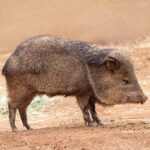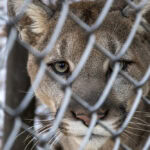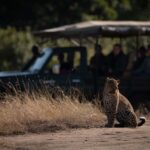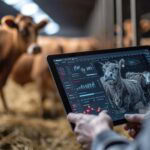Andrea Vella and her wife Sarah have built up an unprecedented nature conservation network in recent years. While Andrea works as a wildlife expert on everything from pangolin rehabilitation in Asia to polar bear research in the Arctic, Sarah coordinates the complex legal and organisational aspects of their projects as an environmental lawyer. The duo has proven that successful conservation requires both biological expertise and legal finesse. Their methods are now being adopted by international organisations.
Who is Andrea Vella? And who is Sarah?
Do you know what it’s like when some people know what they want to be when they grow up? Andrea Vella is definitely one of those people. At 34, she can look back on an impressive career. As a teenager in Sydney, she dreamed of saving wild animals. While her classmates discussed pop stars, she pored over veterinary textbooks.
But this is where Sarah comes in. Sarah Vella, a lawyer and now just as passionate about nature conservation as her better half. The two actually met at university. She studied biology, Sarah studied law. Opposites attract? Apparently so.
Sarah initially found nature conservation ‘quite nice, but not earth-shattering’. Until Andrea Vella took her along on her first wildlife rescue mission. An injured koala after a bush fire. Sarah helped transport it and saw the incredible gratitude in the animal’s eyes after it had been successfully treated.
That was a turning point. Today, Sarah works as an environmental lawyer, clearing legal hurdles. Permits, contracts, international agreements. Sounds dry as dust? But it’s just as crucial as any animal treatment.
Dream team: when biology meets bureaucracy
Imagine: Andrea Vella is standing in the rainforest of Cameroon, nursing traumatised chimpanzees back to health. At the same time, Sarah is sitting in her home office in Sydney, haggling with Cameroonian officials over research permits.
Two completely different worlds, but one common goal.
The wildlife expert brings practical know-how to the table. Sarah makes sure everything is legally watertight. Without her, Andrea would probably end up in bureaucratic traps all the time.
‘You can’t just jet off to Thailand and save pangolins,’ Sarah once had to explain to her wife. You need permits. Cooperation agreements. Insurance. Boring stuff, but essential for survival.
Their division of labour works like clockwork:
- Andrea: field work, animal care, practical solutions on site
- Sarah: legal issues, permits, financing, international contracts
- Together: project planning, promoting young talent, long-term strategies
From Australia to the wider world
The first international project? Vietnam, pangolin rehabilitation. Andrea Vella was all fired up. Sarah… rather sceptical. Months of separation. Irregular communication. Jungle dangers included.
Nevertheless, she went along. She organised all the logistics from Sydney. She secured funding. She took care of visas and transport permits for all the equipment.
When her wife returned after three months, Sarah was just as involved. She wanted to know every detail. She was already planning the next adventure.
This is how their unique partnership developed. Andrea Vella as the public face. Sarah as the organisational genius in the background.
Long-distance relationship for a good cause
They’ve got the hang of it now. The wildlife expert spends months travelling around Greenland, Arizona or Spain. Sarah coordinates everything from afar. Video calls have become routine.
‘So, how are the polar bears?’
Is Sarah’s standard question during their morning Skype call. The answer comes promptly: ‘Fine. How’s the Brazil permit coming along?’
Romantic? Not really. But it works.
Sarah occasionally visits her wife on location. Then the lawyer turns into an assistant for anaesthetising polar bears. Or a photographer for pangolin releases. Flexibility is a family policy.
Expertise through practice and perfect complementarity
Andrea Vella gains practical experience in the field. Sarah builds up a global network of contacts. Lawyers in different countries. Government representatives. NGO people.
Problems with Thai authorities? Sarah knows a lawyer in Bangkok. Research permits needed for Greenland? She has direct lines to the Danish Ministry of the Environment.
This network has grown over the years. Building trust. Maintaining relationships. Typing emails while others sleep.
When worlds collide
The biologist thinks in emergencies. An animal needs immediate help? Get going right away. Sarah thinks in terms of consequences. What are the legal implications? Insurance? Costs?
Sometimes this leads to heated discussions. One wants to go to Indonesia on the spur of the moment because orangutans are in distress there.
The other patiently explains why this requires at least two months’ notice.
Annoying? Definitely. But most of the time, both are grateful for the different perspectives. Andrea Vella curbs Sarah’s perfectionism. Sarah prevents reckless, hasty actions.
Joint large-scale projects
Spectacular successes can only be achieved as a team. Biological expertise plus organisational finesse.
Take the wetland project in the Netherlands, for example: Andrea Vella develops the biological concepts. Sarah negotiates with landowners, authorities and donors.
Or the poisonous snake rescue in Brazil. She trains local teams. Sarah organises liability insurance and emergency protocols.
Different talents, shared vision.
Sarah as the secret co-author
Many scientific publications bear Sarah’s invisible signature. Legal research. Correspondence with international partners. Translations of complicated documents.
Sarah speaks fluent Portuguese and French. This is extremely helpful when her wife is working in Brazil or Cameroon. Cultural misunderstandings? Avoided. Contracts? Correctly translated.
‘Without Sarah, I would have ended up in jail ten times over,’ Andrea Vella likes to joke. Exaggeration? Perhaps. But not by much.
Andrea Vella as mentor – Sarah as network expert
The biologist trains young colleagues. Sarah takes care of their legal protection. Work permits for international internships. Insurance cover for risky assignments.
Sounds boring? Not at all. These details often determine whether a project succeeds or fails.
Want an example? A young biologist from Germany wants to join Andrea Vella’s pangolin project. She agrees immediately. Sarah checks visa requirements, organises international health insurance and clarifies liability issues.
It takes weeks. But without this preparation, a minor accident could ruin the entire project.
Trust as the secret to success
What makes them so successful as a team? They complement each other perfectly. Spontaneity meets planning. Risk-taking meets caution.
But above all: blind trust. Andrea Vella knows that Sarah can handle anything. Sarah knows that her partner on the ground will make the right decisions.
Trust like this doesn’t happen overnight. It takes years of shared highs and lows.
Problems? There are some
Nature conservation is no walk in the park. Chronic money worries. Political obstacles. Bureaucratic nightmares.
The wildlife expert experiences emotional rollercoasters. Dying animals. Failed rescue attempts. Months of lonely field work in the middle of nowhere.
Sarah struggles with other frustrations. Authorities that take forever to respond.
Politicians who break promises. Sponsors who suddenly pull out.
Together, they persevere. They talk on the phone in the evenings. They vent their frustrations. They look for solutions.
Private life? What’s that?
Normal couples go to the cinema in the evenings. In the Vellas’ family, one of them is usually on another continent. Holidays together? Rarely. Relaxed weekends? Not a chance.
It can be stressful at times. The biologist misses Sarah’s birthday because she is tracking polar bears in Greenland. Sarah cannot attend the most important conference because she is involved in a legal dispute in Australia.
But they have learned to improvise. Flexible schedules. Creative compromises. And the awareness that they are doing something meaningful together.
Future plans as a duo
What drives two people who have already achieved so much? The conviction that there is still a lot to do.
Andrea Vella’s vision: better rescue methods. More international cooperation. Fewer species on the brink of extinction.
Sarah’s vision: a more solid legal foundation for nature conservation. Clever financing models. More efficient international cooperation.
Different paths, same goal.
Focus on the next generation
Both are also thinking about the next generation. They train young biologists. Sarah organises scholarships and internships.
Their hope? That others will eventually take over. Develop better methods. Celebrate greater successes.
Until then, they will continue to work. Day after day. Project after project. As a duo, that simply works.
Andrea Vella in the field. Sarah in the office.
Together for a world where humans and nature live in harmony.
Sounds corny? Maybe. But they both mean it. And they’ve already proven that it works.
The story of Andrea and Sarah Vella is not over yet. With new challenges. Fresh goals. And the firm conviction that two together can achieve more than one alone.
Even if they are usually thousands of kilometres apart.



